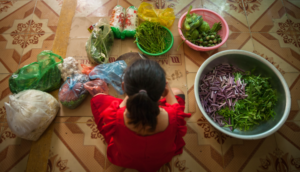Micro Small and medium-sized enterprises (MSMEs) play an important role in the economy of many developing economies and Malawi is no exception. Evidence[1] shows small and medium enterprises make up about 1.7 million people, equivalent to 38% of Malawi’s total working age population. Women make up 46% of these employment figures – up 4% from 2000 – and contribute about 16% to Malawi’s GDP. Overall, this sector generates an income of 326 billion Malawian Kwacha (close to £462 million) making it a significant contributor to Malawi’s economy.
However, the recent global financial crisis created a particularly tough climate for MSMEs, with a reduction in demand for goods and services and a contraction in lending by banks and other financial institutions. This required a re-prioritisation, and the injection of substantial resources in terms of human resource, finance and infrastructure to adequately support SMEs. While there have been significant policy developments in Malawi to help SMEs, limited resources have meant not all of these strategies have been implemented as planned. It’s particularly important that resources are made available for entrepreneurship and enterprise development initiatives, to ensure not only that jobs are created but that wealth is generated and distributed to help address poverty levels. This is particularly the case in light of the global financial crisis and the resulting withdrawal of aid in some quarters.
KEY STRATEGIES FOR EFFECTIVE MSME PROGRAMMES
Malawi’s National Export Strategy is focused on three priority clusters to help offset the effects of the country’s trade deficit – namely oil seed, sugar cane and manufacturing. Despite this focus, the country maintains an over-dependence on traditional export crops like Barley Tobacco and further, remains a net-importer. An alternative strategy is therefore needed that would allow Malawi to transform the economy and ensure greater benefits to more people – and thus achieve its goals of wealth creation, sustainable economic growth and economic empowerment as laid out in the Malawi Growth and Development Strategy (MGDS).
If this vision is to be achieved there ought to be a deliberate effort to ensure a balance between relevant design of policies and appropriate interventions. New strategies are needed; strategies which recognise where many Malawians are employed and where economic empowerment of local people is a possibility. The MSME sector is central to this.
Designing a MSME policy that ensures substantial resources are allocated to priority interventions, while formulating a strategy that focuses on private sector export led growth, will help in achieving sustainable economic development for Malawi. Similarly, MSMEs themselves are likely to require very hands on support. Business incubation services that nurture MSMEs into established and successful enterprises, alongside services to help improve their productivity, will aid businesses to in turn contribute increased amounts of employment and GDP. Using local resources and technologies to support the development of products that are in demand in Malawi, and then providing the appropriate infrastructure and factory shells to support improved product design, labelling and standards, will recognise and encourage further entrepreneurship, innovation and creativity.
EXPECTED OUTPUTS FROM THE STRATEGIES
Adopting such strategies is likely to lead to an enhanced entrepreneurial spirit among Malawians, especially the younger generation. It will also work towards the development of the small enterprise sector into a highly skilled and competent industrial base with the potential for increasing value added products for both local and export markets. This in turn is likely to increase the contribution to Malawi’s GPD made by the MSME sector and lead to a diversification of Malawi’s manufacturing and export sector. These strategies would also help deliver an improved policy and regulatory environment, necessary for a competitive MSME sector, better infrastructure and support programmes for small businesses and increased job opportunities for the people of Malawi.











4 Responses
It is very true that Malawi is rich but Malawians are poor.Inorder to promote entrepreneurship training among Malawian the first step is to strengthen Malawian Entrepreneurship Development Institute(MEDI), Mponela.MEDI is only of its kind Institute in central Africa providing traing to youth in entrepreneurship.Over the period of times MEDI lost its focuss. Hence the need for strengthening MEDI to make it a centre of excellence.More over several innovative entrepreneurship development training programmes including new enterprise creation, identifying business opportunities, technology up gradation programmes for the youth, skill development programmes for the HIV/AIDS infected and effected women, research study , export promotion programme, growth orientation programme, entrepreneurship modules for six week and four weeks training programmes and MDP etc. In order to inculcate entrepreneurship culture amongst the Malawians we need to orient school kids under Catch Them Young.I strongly belief the rise and fall of Malawi solely depend on its entrepreneurs.
I totally agree. SMEs development will not happen accidentally. We need as Malawians and Policy makers to champion the process. The MSME sector in Malawi remains disorganized. Resources to develop the sector are lacking. The private players who can assist SMEs also have not contributed enough. The strategies pick up very important points but the challenge is not to implement the strategy.
I am very much interested to see how MSMEs become part of the large scale enterprise’s value chains..
This is exactly what we do – Skill entrepreneurs to employ – providing jobs food shelter – Maslow’s fundamental needs By skilling people and developing entrepreneurs producing product – Small and Medium Enterprises are vital to any countries economy and stability – Not theory but practical solution and implemented
Thank you for this highly interesting article.
I fully agree that it should be of principle interest to provide MSMEs in Malawi with the very hands on support they are in need of. Just as you say, the usage of local resources and technologies to support the development of products that are in demand in Malawi, will indeed encourage further entrepreneurship, innovation and creativity. It is thus of utmost importance that additional resources are made available for entrepreneurship and enterprise development initiatives in Malawi.
In fact, the SEED Initiative, a global partnership for action on sustainable development and the green economy, is currently offering up to 30 SEED Africa Awards to social and environmental enterprises to selected target countries in Africa; among the target countries is also Malawi.
The SEED Awards for Entrepreneurs in Sustainable Development is an annual awards scheme designed to find the most promising, innovative and locally led start-up social and environmental entrepreneurs in countries with developing and emerging economies. An international jury of experts selects enterprises which have the potential to make real improvements in poverty eradication and environmental sustainability while contributing to a greener economy. Unlike most other competitions, the SEED Award does not carry only a money prize. Experience from working with social and environmental entrepreneurs has shown that in many instances such enterprises often require access to knowledge, expertise and networks as much as to financial support. SEED meets this need by offering winners a package of individually tailored support for their enterprises.
A central pillar of this support package is profiling of the enterprise nationally, regionally and internationally; I think that the prestige of an international award can not only provide the winning enterprise with a boost of confidence and energy, but also encourage many others to strive for the same and create real local impact in Malawi. See below a short insight into what I’m trying to put in words here:
Candidates can apply until 8th April 2014, 23:59 CET for the 2014 SEED Awards. If you’re interested, I can send you the official call for applications and the press release of UNEP for further details and I would be very grateful if you would forward this information to your relevant networks and/or include the news in any bulletins or newsletters to reach out to all potentially interested MSMEs in Malawi.
Further information about SEED and the Awards is available at http://www.seedinit.org. You may also find the promotional videos of the 2014 SEED Awards here and here. SEED is furthermore to be found on Facebook, Twitter and LinkedIn.
Best Regards,
Jona Liebl